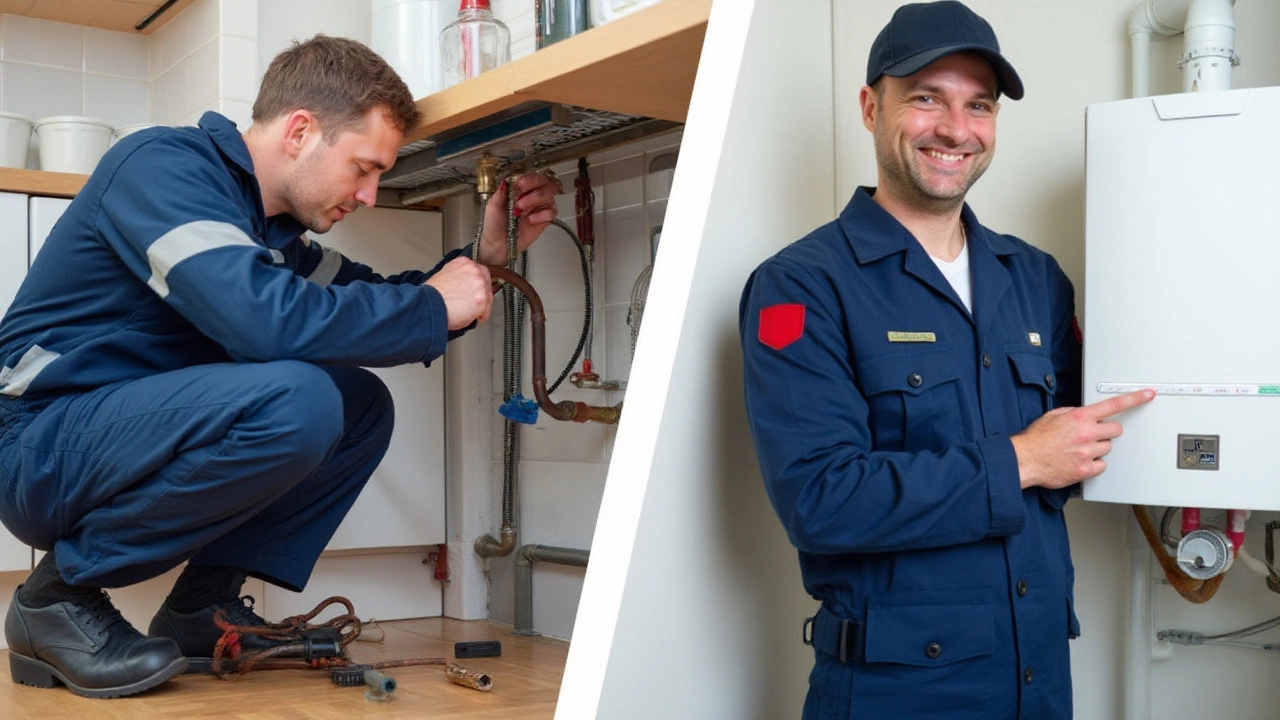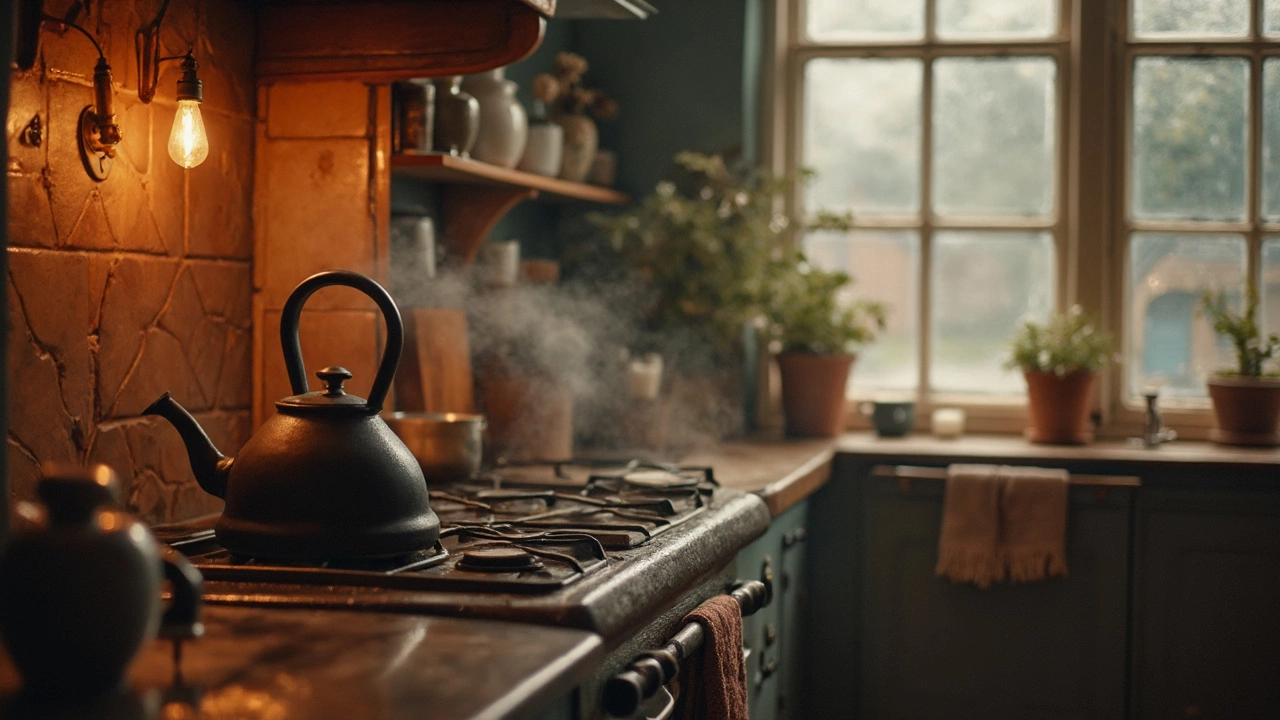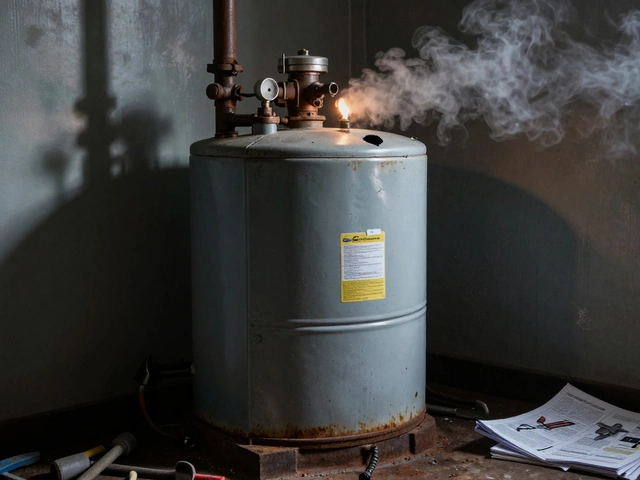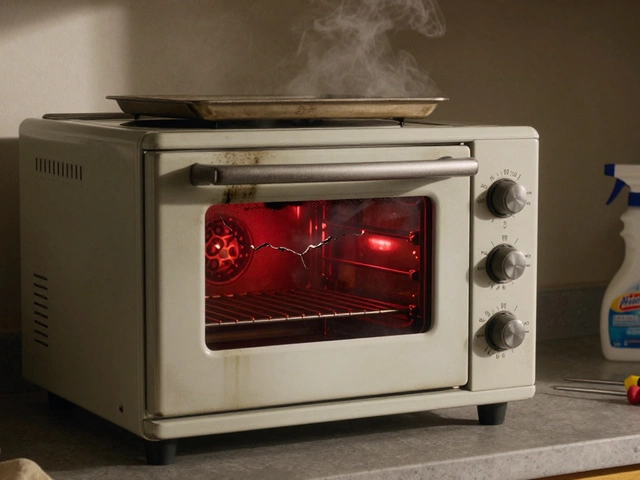Homeowners frequently puzzle over whether their trusted plumber is the right person to turn to for a boiler issue. While it's tempting to assume that any heating problem is within a plumber’s wheelhouse, it’s not always so straightforward. Boilers operate with complex systems that require specific expertise to diagnose and repair efficiently.
Before reaching for the phone, it’s helpful to grasp the distinction between the skill set of a plumber versus that of a specialized heating engineer. Not only will this knowledge arm you with the right questions to ask, but it ensures you're enlisting the help of someone who can truly solve your boiler blues. Let’s delve into the facets of what plumbers can and cannot do when it comes to boilers.
- Understanding Plumbers' Skillsets
- Boiler Types and Common Issues
- When to Call a Plumber
- The Role of a Heating Engineer
- Preventative Measures for Boiler Maintenance
Understanding Plumbers' Skillsets
When it comes to maintaining and repairing household systems, a plumber is often seen as the jack-of-all-trades. These skilled professionals are well-versed in handling a variety of issues related to water and gas lines, drainage systems, and more. Their expertise is particularly pronounced in fixing leaks, unclogging drains, and installing fixtures, which involve a deep understanding of how fluids circulate within a building’s infrastructure. However, when it comes to appliances like boilers, the expertise required can sometimes go beyond the typical scope of a plumber's work. Boilers don’t just involve pipes and water flow; they require knowledge of heating systems, including electrical components and sometimes gas lines, which can be a complex area even within the realm of plumbing.
The average plumber will be equipped to address basic piping issues associated with a boiler, such as fixing linked leaks or replacing sections of pipe. They may also be involved in the initial installation of the system’s plumbing. Yet, it's crucial to recognize that boiler systems often have intricate control systems and safety components. This sophistication necessitates not only an understanding of plumbing but also a proficiency in electronics and, often, gas safety. This is where the distinction needs to be made between a typical plumber and a specialized heating engineer.
In terms of formal qualifications, plumbers typically undergo training that covers a broad range of skills, including pipe fitting, drain cleaning, installation, and maintenance of plumbing fixtures. They may receive certification from reputable trade schools and need to meet licensing requirements, which vary by region. However, only those who have pursued further certification or have significant on-the-job experience specifically in heating systems might possess the technical know-how and authority to carry out complex boiler repairs safely and effectively. Not every plumber opts to specialize in boiler repair, given the additional certification or training it requires.
"In many cases, a plumber who attempts to fix a boiler without the proper certification may inadvertently void your warranty," warns George White, a spokesman from the National Association of Plumbing Services.
Given the safety regulations involved, hiring a plumber without the appropriate skills and certifications for a boiler repair could not only fail to fix the problem, but may also lead to more serious issues. In regions where plumbers aren’t mandated to be qualified gas engineers, it's critical for homeowners to ensure the individual they hire is vetted for the specific kind of repair needed. While plumbers have a versatile skill set, understanding what aspects of boiler repair fall outside their scope can save homeowners from future headaches.
The key takeaway is to ask about their experience with boiler repair and look for those who advertise specific skills or training in this area. In some cases, plumbers work in teams or companies that employ both general and specialized technicians. This collaborative approach can provide a more comprehensive solution for household repairs, as it brings together cross-disciplinary skills under one roof.
Boiler Types and Common Issues
When it comes to selecting or troubleshooting a boiler, understanding the variety of types available—and the issues each type might present—is essential knowledge for any homeowner. Boilers, which can be found in numerous shapes and sizes in different homes, generally fall into three main categories: combi boilers, system boilers, and conventional boilers. Each has its unique characteristics and common problem areas. A combi boiler, known for its efficiency and compactness, can provide both heating and hot water directly from the mains. However, given its complex nature, it's not immune to issues like leaks and low pressure, which can impede its performance.
Another popular choice, the system boiler, works alongside a separate hot water cylinder to cater to the heating needs of larger homes. Despite their capacity to deliver hot water simultaneously to multiple taps, they can face challenges such as thermostat failures and uneven heating. Then there are the traditional conventional boilers, which have stood the test of time and often come paired with a distant tank. While robust, they too may suffer from faulty pilot lights or worn-out components, making them expensive to maintain over time.
Beyond the boiler types, it’s crucial to recognize some universal issues that can plague any system. For instance, airlocks and water leaks are particularly unsettling problems. Airlocks prevent water from flowing efficiently, while leaks not only degrade system efficiency but pose safety risks as well. One expert notes,
"A small leak today can lead to a costly overhaul tomorrow. Consistent maintenance checks can save homeowners from bigger headaches down the line," says an industry consultant.Ensuring the longevity and efficacy of your boiler often demands a proactive stance—regular check-ups and timely repairs can work wonders in preventing small issues from snowballing into larger, more costly ones.
To better navigate the intricacies of boiler repair, homeowners are encouraged to familiarize themselves with the specific manual of their system. These manuals often contain troubleshooting steps or regular maintenance tips, empowering them to understand when professional intervention is necessary. It’s not just about understanding the mechanics; it’s also about knowing the signs. Hearing strange noises, facing fluctuating temperatures, or noticing an increase in energy bills are telltale indicators of potential problems that should never be ignored. Taking the time to educate yourself can pave the way for a comfortable, efficient home, even in the heart of winter.
If you're someone who enjoys diving deeper, you might find it intriguing to learn that the efficiency ratings of boilers, often labeled as ErP ratings in the UK, can significantly influence your energy usage. Higher ratings correlate with energy efficiency, reducing not only the carbon footprint but also utility costs. Harnessing this information can facilitate informed decisions, making the balance between initial costs and long-term savings clear. Thus, being mindful of these aspects while exploring plumber or technician services can lead to meaningful household improvements.
In conclusion, while boilers may appear daunting due to their complexity and the jargon surrounding them, gaining a strong foundational understanding of how they operate and the common issues they face can empower homeowners. This solid ground prepares them to approach potential repairs with an informed mindset, ensuring that when boiler trouble does arise, they know exactly whom to call—be it a plumber for general assistance or a specialized technician for more complex tasks.

When to Call a Plumber
Deciding when to call a plumber instead of a heating engineer hinges on understanding the nuances of your boiler’s symptoms. Most homeowners believe that any water-related issue should immediately be directed to a plumber, which holds true in many cases, but not all. In instances where you encounter leaks or dripping water from pipe joints surrounding a boiler, a plumber is likely the first call you should make. Leaks are within the classic scope of a plumber's duty because they have the necessary skills to address water supply lines and similar challenges efficiently.
It’s crucial to recognize that boilers combine elements of plumbing with complex heating systems. In situations where the issue stems from the water supply or pressure issues, a plumber possesses the expertise to fix these problems straightforwardly. Interestingly, surveys reveal that nearly 30% of water-related issues around boilers dealt with by plumbers stem from improper fittings or regular wear and tear, which need expert attention to prevent further damage.
However, the decision isn’t always straightforward and depends largely on the visible symptoms of your boiler. If, for example, the boiler is functioning but making unusual noises such as banging or whistling, and the source seems to be related to water hammer or trapped air, it's safe to call a plumber. They can diagnose whether it's an issue with the water line or pipes surrounding the boiler. In such cases, a skilled plumber can identify potential airlocks or faulty valves and either repair them or suggest replacements.
"Sometimes, it's the hidden issues within the pipework that's genuinely the culprit," says Mike Turner, a seasoned plumber with over 20 years of experience. "A plumber’s insights into the interconnected worlds of water flow and piping play a vital role in maintaining harmony in your home’s plumbing infrastructure."
Aside from leaks and pressure concerns, other indications to call a plumber include visible corrosion or visible rusty spots on the piping. Plumbers can replace these sections before they worsen, ensuring your system's integrity. By handling these smaller issues, homeowners prevent them from escalating into more costly repairs that might necessitate tearing out walls or floors to access compromised pipes.
Understanding these distinct circumstances where a plumber is the right professional to call can make a significant difference in your maintenance costs and stress levels. Remember that your plumbing system is an intricate web supporting your household’s smooth operation. Thus, having a plumber adeptly handle water-based troubles can save immense hassle and help prolong the life of your heating assets.
The Role of a Heating Engineer
When your boiler is acting up, it’s essential to understand the distinct role a heating engineer plays compared to a general plumber. Heating engineers are specialists in everything related to heating systems and boilers, armed with the expertise required to tackle even the most perplexing of boiler problems. Unlike plumbers, who predominantly focus on water and drainage issues, heating engineers delve into the mechanics of heating appliances, ensuring they operate at peak performance.
The heating engineer's training is rigorous, typically encompassing both theoretical knowledge and hands-on experience with a myriad of boiler types and common issues. These professionals are also well-versed in adhering to safety and efficiency standards. Importantly, they hold relevant certifications, such as Gas Safe registration in the UK, which confirms their competency to work safely with gas appliances.
Imagine your boiler's burner suddenly goes haywire on a freezing winter morning. A heating engineer would approach this by conducting thorough diagnostic trials, perhaps checking the flow of gas, the electrical integrity of the unit, and the operation of the thermostat, among other components. Their focused expertise ensures that they not only identify the underlying cause but offer specific solutions where a general plumber might not.
Comprehensive Boiler Maintenance
An essential aspect of a heating engineer’s role involves regular boiler maintenance—an activity that many overlook until a problem arises. Routine checks can often prevent future breakdowns and maintain the appliance's efficiency. Services provided during a maintenance visit are typically extensive, ranging from cleaning and adjusting burner components to testing boiler flue ventilation.
Cahla Thornton, a seasoned heating engineer, notes, “Effective maintenance isn’t just about avoiding problems; it’s about optimizing performance. Think of it like a car; you wouldn’t expect it to run smoothly without regular oil changes and check-ups.”
Preventative measures can significantly prolong the lifespan of a boiler while ensuring safety throughout its use. Let’s take an average lifespan statistic: well-maintained boilers can last over 15 years. Such longevity isn't just about fortuitous manufacturing; it’s due to committed and comprehensive service provided by an expert. Boiler maintenance involves steps like checking for leaks, ensuring pressure system stability, and validating the overall health of the heating system, all tasks best left to certified heating engineers.
Advanced Troubleshooting and Repairs
When breakdowns happen, heating engineers are equipped with the tools and the knowledge to perform complex troubleshooting. They are capable of interpreting error codes that might flash on modern boiler systems and possess the perspective to see connections between various system components. Whether the issue lies with a faulty heat exchanger or a misfiring pilot light, these professionals use a sequenced and methodical approach to fix the heart of the problem.
To conclude, the role of a heating engineer is indispensable when it comes to addressing intricate boiler issues. Their specialized training and industry knowledge make them the go-to professionals when the warmth in your home is at stake. Not only do they provide effective solutions, but they do so with a mindfulness to safety and long-term efficiency, ensuring you and your boiler remain in good hands.

Preventative Measures for Boiler Maintenance
When it comes to taking care of your boiler, the importance of preventative measures cannot be overstated. By ensuring that your boiler is kept in good shape, you reduce the risk of encountering unexpected breakdowns and extend its overall life. Regular care is essential, and there are several key steps you can take to keep your system operating smoothly. The most crucial element is committing to an annual service, which is something that any homeowner should prioritize. Having professionals inspect your boiler annually can unearth potential issues before they escalate into costly problems.
Regular checks by skilled technicians are vital, but there are some steps you can take independently too. Keep the area surrounding your boiler clean and free from clutter to promote ventilation, which is vital for the unit’s efficiency. It’s also wise to monitor the boiler pressure, as excessively low or high pressure can indicate a problem requiring urgent attention. Simply checking your boiler’s pressure gauge weekly can help you catch anomalies early. Additionally, bleeding your radiators helps to improve efficiency by removing unwanted air pockets.
Boiler maintenance doesn’t just end with mechanical check-ups. Pay attention to signs of wear and tear such as leaks or unusual noises, and act swiftly if you notice anything amiss. A quick response can save you from bigger issues down the road. It’s equally important to understand the types of boiler repairs you might encounter. Homeowners often underestimate the importance of having a basic knowledge of the system to articulate problems better when contacting professionals.
Every year, thousands of homeowners face unexpected boiler breakdowns due in part to neglected maintenance. According to a report by Which?, regular maintenance can prevent up to 90% of common boiler issues.
Don’t overlook the power of a digital thermostat or smart controls; not only do they offer convenient temperature management, but they can signal usage trends, which help optimize your boiler's performance. Moreover, following a servicing schedule religiously is as integral as regular car maintenance—it’s part of maximizing longevity. If you have an older boiler model, think about a modern upgrade that is energy-efficient and environment-friendly. Many newer models boast incredible efficiency rates, saving you on energy bills and carbon footprint.
Finally, who says you can’t incorporate fun elements into your boiler maintenance? Encourage learning by engaging with online tutorials that offer a wealth of DIY tips, or join community forums where experiences are exchanged and questions answered. With meticulous maintenance, the investment you place in care today will pay off by ensuring both longevity and peace of mind tomorrow.





